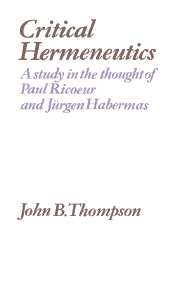Book contents
- Frontmatter
- Contents
- Foreword by Anthony Giddens
- Preface
- Introduction
- Part I Thematic exposition
- 1 Ludwig Wittgenstein and ordinary language philosophy
- 2 Paul Ricoeur and hermeneutic phenomenology
- 3 Jürgen Habermas and critical social theory
- Part II Constructive critique
- Conclusion
- Notes
- Select bibliography
- Index
1 - Ludwig Wittgenstein and ordinary language philosophy
Published online by Cambridge University Press: 10 December 2009
- Frontmatter
- Contents
- Foreword by Anthony Giddens
- Preface
- Introduction
- Part I Thematic exposition
- 1 Ludwig Wittgenstein and ordinary language philosophy
- 2 Paul Ricoeur and hermeneutic phenomenology
- 3 Jürgen Habermas and critical social theory
- Part II Constructive critique
- Conclusion
- Notes
- Select bibliography
- Index
Summary
Ordinary language philosophy may be regarded as the second stage in the development of the contemporary analytical school. The first stage in this development is represented by logical atomism and its positivistic offspring within the Vienna Circle; and it was through the critique of these early positions that the second stage emerged. The writings of Ludwig Wittgenstein figure prominently in both of these stages, as well as in the transitional phase between. Consequently, in the present chapter, I attempt to unfold the evolution of analytical philosophy by following the development of Wittgenstein's ideas. In adopting this approach, I seek neither to underrate the contributions of other analytical philosophers, nor to overrate the extent to which these philosophers agree among themselves. Rather, my aim is to facilitate the exposition of ordinary language philosophy by focusing the discussion around the writings of a single author. One consequence of this approach is that recent developments in analytical philosophy, such as those associated with the names of Quine and Davidson, will not be presented here; and although I shall refer to some of these developments in subsequent chapters, they will not form a focal point of this study.
Philosophical background
Logical atomism
The first stage of contemporary analytical philosophy comprises logical atomism and its audacious heir, logical positivism. The principal proponents of the former doctrine were Russell and the early Wittgenstein, who were among a handful of philosophers responsible for the downfall of British idealism.
- Type
- Chapter
- Information
- Critical HermeneuticsA Study in the Thought of Paul Ricoeur and Jürgen Habermas, pp. 9 - 35Publisher: Cambridge University PressPrint publication year: 1981

